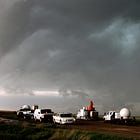Climate costs are beginning to permeate the economy
Delayed action, misaligned subsidies & slow innovation are bringing costs to industry, food systems, finance & the everyday economy. Deregulation & data suppression are making things worse.
A jury has ordered Chevron to pay $744 million for destroying Louisiana wetlands
The case is just the first of 42 filed around 12 years ago, alleging long-running industrial disruption and destruction of the region’s wetlands. The Guardian reports:
From 1932 to 2016, coastal Louisiana experienced a net change in land area of approximately -4,833 square kilometers, marking a decrease of approximately 25% of the land area at the beginning of that time period.
The canals used to create transportation routes for oil and gas rigs have over the years impeded natural water flow across the wetland ecosystems, according to the Lowlander Center. Additionally, the canals create straight avenues which allow surging ocean waters to bypass the bayous and instead head directly inland during severe weather events.
The case is also emblematic of the trend toward more focused litigation, seeking to hold industrial polluters accountable for harm to local communities, and for violating rights against preventable harm. Since the First Amendment prohibits laws that reduce the right to redress, rolling back of regulations suggests many more such suits will follow.
Report finds climate-induced water scarcity spreading hunger in Africa
Oxfam has released a briefing paper detailing the worsening water crisis affecting key food-growing regions of Africa. According to the report:
The climate crisis in Eastern and Southern Africa has significantly affected food systems by altering climatic zones across various altitudes and regions.
A striking indicator of climate change has been the observed recession of tropical glaciers in East Africa (Tanzania, Kenya, Uganda) since the 18th century. Today, Mount Kilimanjaro has lost 91.4% of its glaciers, Mount Kenya has lost 95.8%, and the Ruwenzori Mountains have lost 94.2%. This serves as a clear sign of a shift toward a drier climate in East Africa, threatening hydrology, ecosystems, and traditional irrigation systems on the slopes of these majestic mountains.
The research also finds:
The climate crisis in East and Southern Africa has drastically affected water cycles, surface and groundwater availability, agricultural production, livestock health, and fisheries. Notably, rainfall has decreased by up to 10% in parts of East and Southern Africa since the late 20th century4, destabilizing agriculture, where approximately 91% of crops rely on rain-fed systems…
Tariffs are teaching us about climate breakdown
Our strategic foresight note outlining similarities between trade war ripple effects and climate breakdown has been expanded and further detailed. We have added actionable insights, including:
Climate breakdown negotiations can start long before disaster strikes, and should be used to build a safer, freer, more resilient future. While a lot of emphasis on climate cooperation focuses on emissions trading, the Paris Agreement calls for ‘non-market’ cooperation—everything that is not emissions trading—to reduce climate danger, support adaptation and resilience, fight poverty, and support sustainable development.

The piece also now includes this guidance on readiness and resilience:
As nations and groups of nations work to extricate themselves from the threat of unchecked tariff-driven economic chaos, they should look not only to reduce trade barriers, but to create smart, cooperative, outcome-focused trade blocs, where those creating the most value for climate-resilient development are supported by market trends and incentives.
More warnings about economy-wide risk from unchecked climate disruption
This week a senior leader for Allianz, the insurance giant, warned the current worsening trend toward uncontrolled global heating is putting the insurance industry, the financial sector, and capitalism itself at risk. Specifically, the warning notes that global heating of 3°C or more would make it impossible to safely adapt, rendering insurance services and financial risk unmanageable, creating an existential threat to the mainstream economy.

Even as tariffs erase $6.6 trillion in wealth from U.S. financial markets (for reference, only the U.S. and China generate more than $6.6 trillion in total annual economic output), past warnings from the Financial Stability Oversight Council and the Commodity Futures Trading Commission, which both found unchecked climate change would destroy the economy, have renewed weight.
RELATED READING










